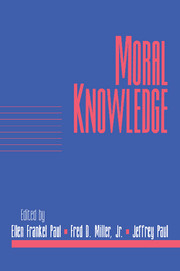Book contents
- Frontmatter
- Contents
- Introduction
- Acknowledgments
- Contributors
- Realist-Expressivism: A Neglected Option for Moral Realism
- Thinking about Cases
- But I Could Be Wrong
- Moral Facts and Best Explanations
- Two Sources of Morality
- “Because I Want It”
- Realism, Naturalism, and Moral Semantics
- Incomplete Routes to Moral Objectivity: Four Variants of Naturalism
- Explanation, Internalism, and Reasons for Action
- Moral Knowledge as Practical Knowledge
- Practical Reason and Moral Psychology in Aristotle and Kant
- Hypothetical Consent in Kantian Constructivism
- Mill's “Proof” of the Principle of Utility: A More than Half-Hearted Defense
- Index
Hypothetical Consent in Kantian Constructivism
Published online by Cambridge University Press: 04 August 2010
- Frontmatter
- Contents
- Introduction
- Acknowledgments
- Contributors
- Realist-Expressivism: A Neglected Option for Moral Realism
- Thinking about Cases
- But I Could Be Wrong
- Moral Facts and Best Explanations
- Two Sources of Morality
- “Because I Want It”
- Realism, Naturalism, and Moral Semantics
- Incomplete Routes to Moral Objectivity: Four Variants of Naturalism
- Explanation, Internalism, and Reasons for Action
- Moral Knowledge as Practical Knowledge
- Practical Reason and Moral Psychology in Aristotle and Kant
- Hypothetical Consent in Kantian Constructivism
- Mill's “Proof” of the Principle of Utility: A More than Half-Hearted Defense
- Index
Summary
PROLOGUE: KANTIAN CONSTRUCTIVISM AND MORAL EPISTEMOLOGY
Epistemology, as I understand it, is a branch of philosophy especially concerned with general questions about how we can know various things or at least justify our beliefs about them. It questions what counts as evidence and what are reasonable sources of doubt. Traditionally, epistemology focuses on pervasive and apparently basic assumptions covering a wide range of claims to knowledge or justified belief rather than very specific, practical puzzles. For example, traditional epistemologists ask “How do we know there are material objects?” and not “How do you know which are the female beetles?” Similarly, moral epistemology, as I understand it, is concerned with general questions about how we can know or justify our beliefs about moral matters. Its focus, again, is on quite general, pervasive, and apparently basic assumptions about what counts as evidence, what are reasonable sources of doubt, and what are the appropriate procedures for justifying particular moral claims.
If we were to assume that moral beliefs are substantially like beliefs about the empirical features of the world, then moral epistemology would face the task of explaining the apparent disanalogies between the procedures of giving evidence for empirical propositions and providing reasons for moral claims. If, instead, we supposed that fundamental moral propositions are about nonempirical objects in the same way that fundamental propositions of mathematics are (on some interpretations), then moral epistemology would face a different set of problems. The special problems raised by moral realism of both kinds, and by skeptical doubts about the underlying assumptions of each kind, are so frequently discussed that they may seem to exhaust the field of moral epistemology.
- Type
- Chapter
- Information
- Moral Knowledge , pp. 300 - 329Publisher: Cambridge University PressPrint publication year: 2001
- 1
- Cited by

